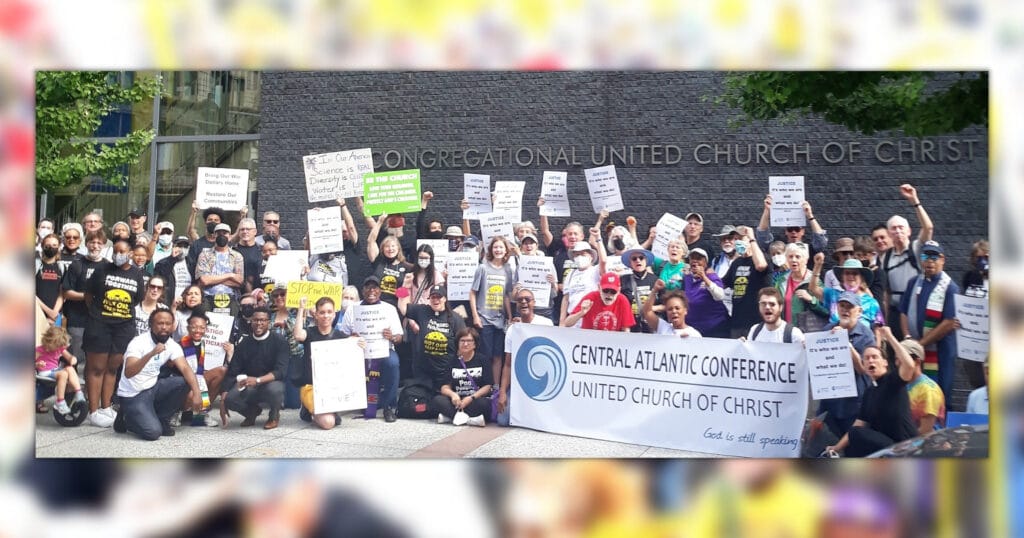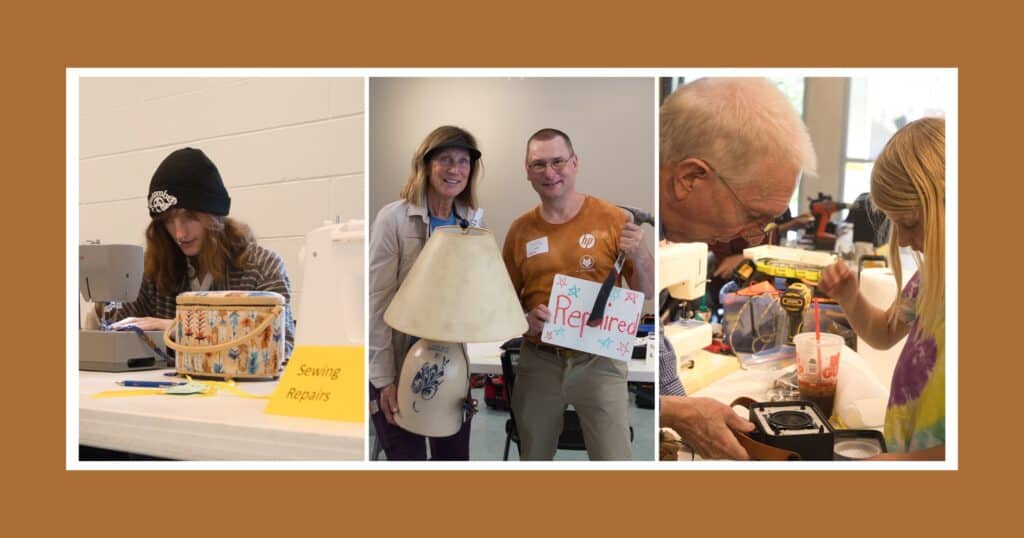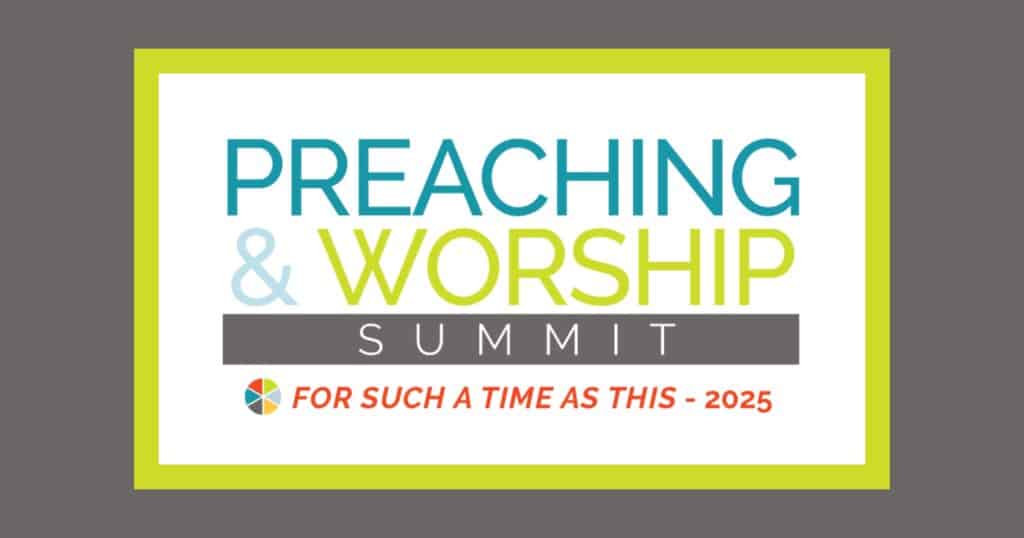Food, grief, coffee, shouts, a march: Poor People’s Campaign energizes thousands
Thousands of activists converged on the nation’s capital June 18 to shout, celebrate, mourn, issue demands and declare their mutual resolve to end poverty.
It was the Poor People’s Campaign‘s long-awaited Moral March on Washington.
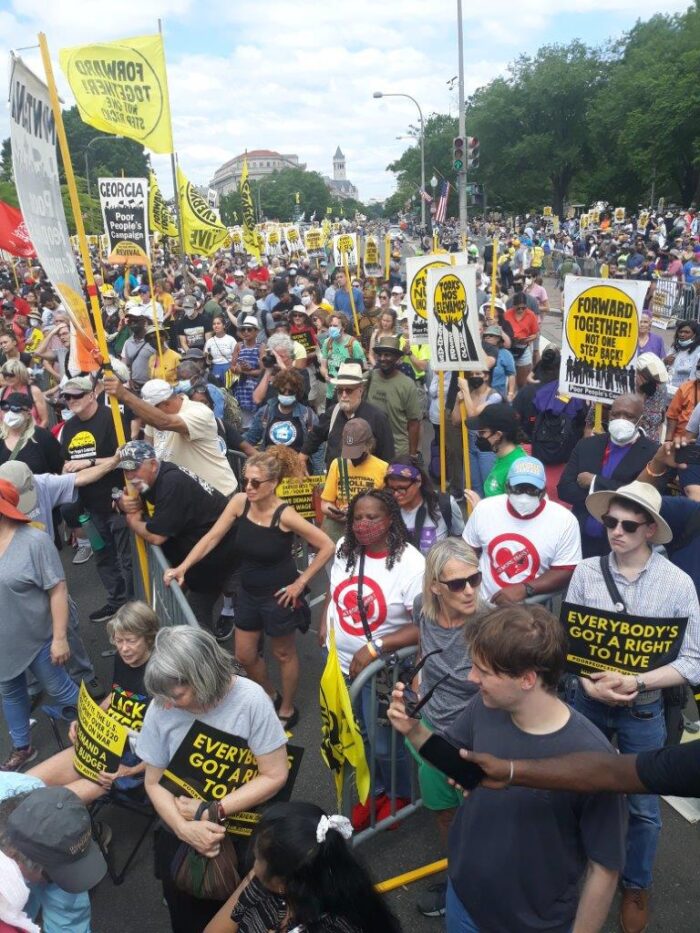
The Saturday event drew religious advocates, labor organizers and pro-democracy activists. There were people concerned about climate breakdown, health care, reproductive justice, education, LGBTQ equality, gun violence and more.
United Church of Christ clergy and laity were there. Nearly 100 of them, from several states, met up early to walk together to the rally. “Forward together, not one step back,” they chanted before leaving First Congregational UCC. More UCC’ers — in still-being-counted numbers — arrived separately and blended in with the mass gathering on Pennsylvania Avenue.
‘A lot of passions’
Some UCC participants said they were attracted, in part, by what the campaign calls its “moral fusion” approach: a big-tent emphasis on fighting interlocking social ills.
The Rev. Nancy Leckerling, a member of First Congregational UCC, Guilford, Conn., gave credit for that to the campaign’s national co-chairs, the Revs. William Barber II and Elizabeth Theoharis. “It’s the first time I’ve heard people articulate intersectionality so effectively,” she said.
Her husband, Jon Leckerling, added that the UCC itself is “a big tent.” “It’s got a lot of passions. The Poor People’s Campaign helps pull these together.”
Eli Anthony, who belongs to Boston’s Old South Church, UCC, had similar thoughts. He is also an urban pastoral ministry resident with the UCC-related City Mission in Boston. “Systemic oppression is not just people in power doing one thing,” he said. “To fight the weight of injustice, we don’t need to fight just one thing.”
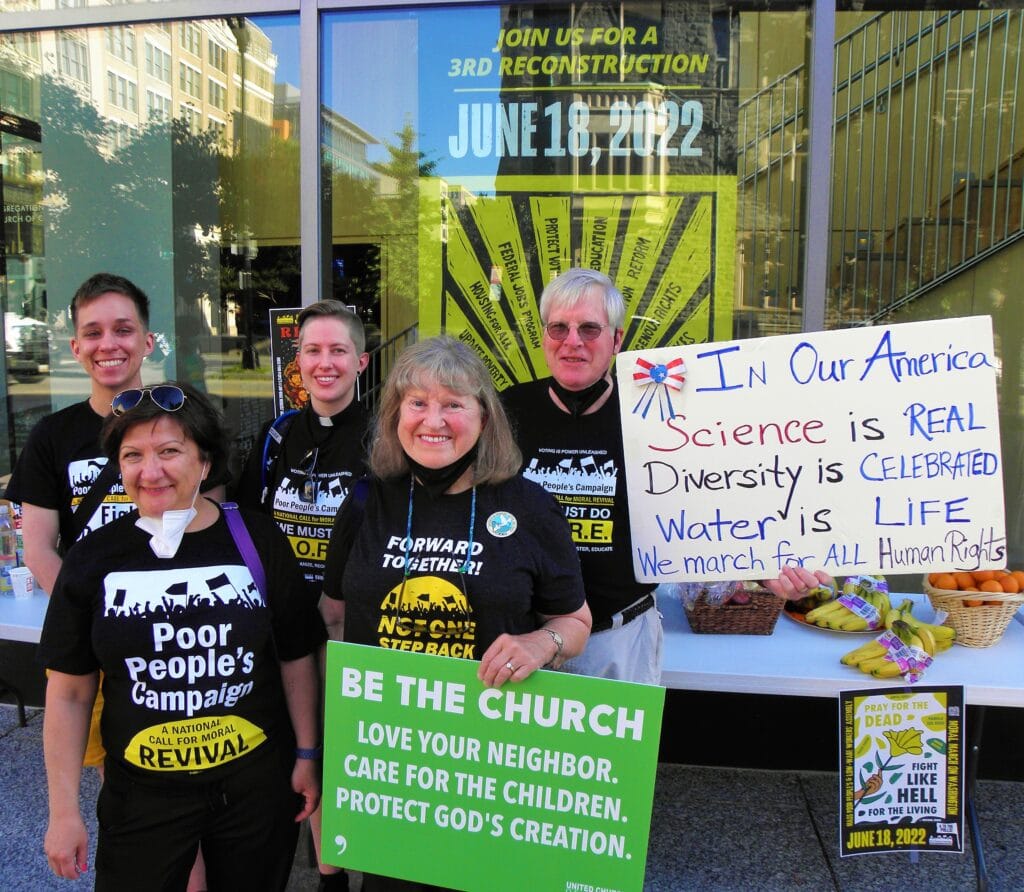
‘Faith in action’
And there’s value in taking those principles to the streets, said Tamar Wasoian, also a City Mission pastoral resident. She called the June 18 rally “faith in action.” “Inside the church, we talk about faith,” she said. “Outside, we act on our faith.”
The Leckerlings, Anthony and Wasoian were all part of the UCC crowd at a 7:30 a.m. coffee hour on the D.C. sidewalk in front of First Congregational. An informal sign-in sheet showed not only people from many D.C. churches but also from California, Maryland, Minnesota, North Carolina, Ohio and Virginia. UCC participants were also sighted from as far away as Iowa and Oregon.
Before walking a mile to the assembly, they moved inside the church and responded energetically to a UCC welcome from its senior minister, the Rev. Amanda Hendler-Voss; the Rev. Marvin Silver, associate Conference minister of the Central Atlantic Conference; and Michael Neuroth, a policy advocate with the D.C.-based Office of Public Policy and Advocacy.
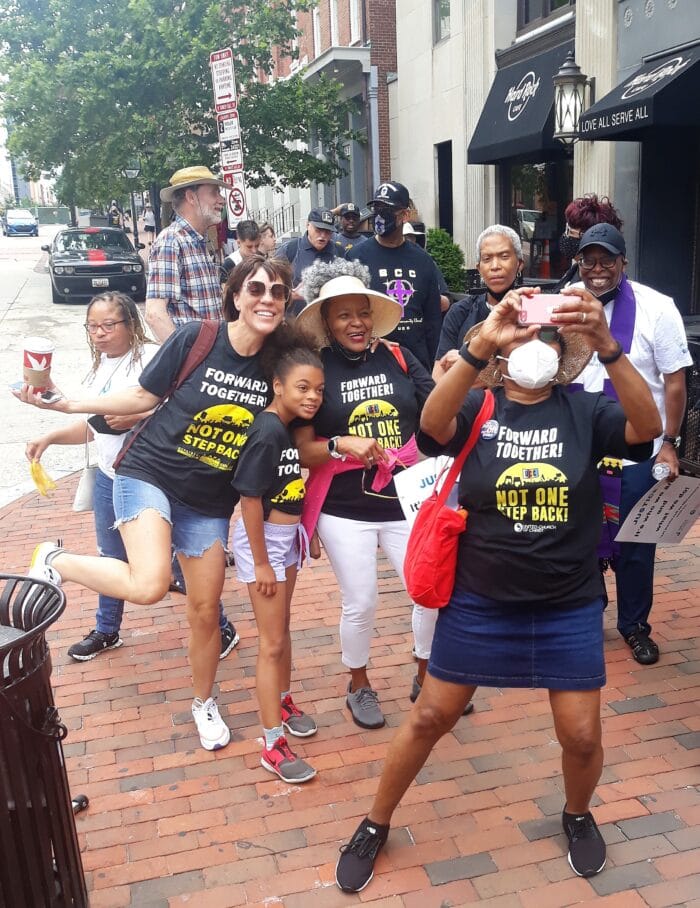
River of people
As the UCC contingent turned left from 10th Street onto Pennsylvania, the magnitude of the event became clear. They merged into a river of people on foot, flowing as far as the eye could see ahead toward the U.S. Capitol, and stretching just as far behind them, too. Interspersed along the avenue were big video screens and loudspeakers, some with folding chairs set up, carrying the program from the main event stage.
Along the way, there were enough stick-mounted, campaign-branded signs for anyone who wanted one — in English or Spanish. They said things like:
- “Everybody’s got a right to live”
- “A new unsettling force”
- “We are the 140 million: poor and low-wage people”
- “Everybody rises — lift from the bottom”
And there were impromptu displays along the way, too. A near-life-size replica of a battle tank was emblazoned with the words “demilitarize everything.” People festooned it with more messages: “Books, not bombs.” “Fund reparations, not occupations.” “Food, not F-35s.” “Money for the poor, not war.”
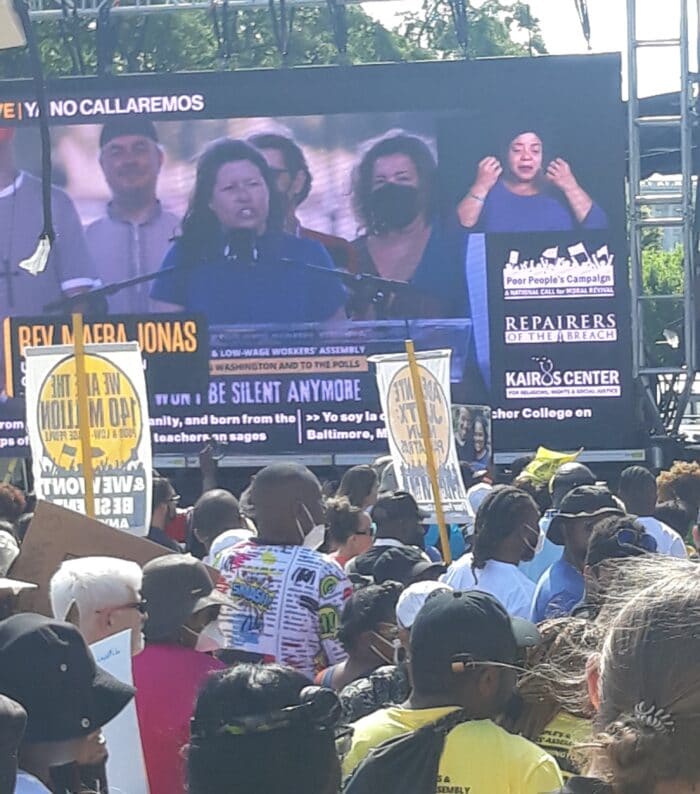
‘Won’t be silent’
Marchers approaching the main stage could already hear an opening “moral grounding” litany read by speakers from a broad range of faiths, including two from the UCC:
- “In this world of abundance, not scarcity, we cry out, ‘There is enough for everyone’s needs,'” said Sandy Sorensen, director of the UCC’s D.C. office. “But there is not enough for such corporate greed.'”
- “From the truth of our humanity, and borne from the lips of our many prophets, teachers and sages, we solemnly commit to doing justice, to loving one another, and to striving until victory is ours,” said the Rev. Maeba Jonas, director of religious and spiritual life at Baltimore’s Goucher College.
In the five hours that ensued, the spiritual mixed with the secular.
Gospel songs met testimonials from coal miners and call-center workers. Baptists stood alongside Democratic Socialists. Theologian Cornel West stirred up the crowd; former Vice President Al Gore greeted them by video. On cue from Barber — who emceed the entire day — the crowd often responded to speakers by shouting: “And we won’t be silent anymore.”
Seven steps to midterms
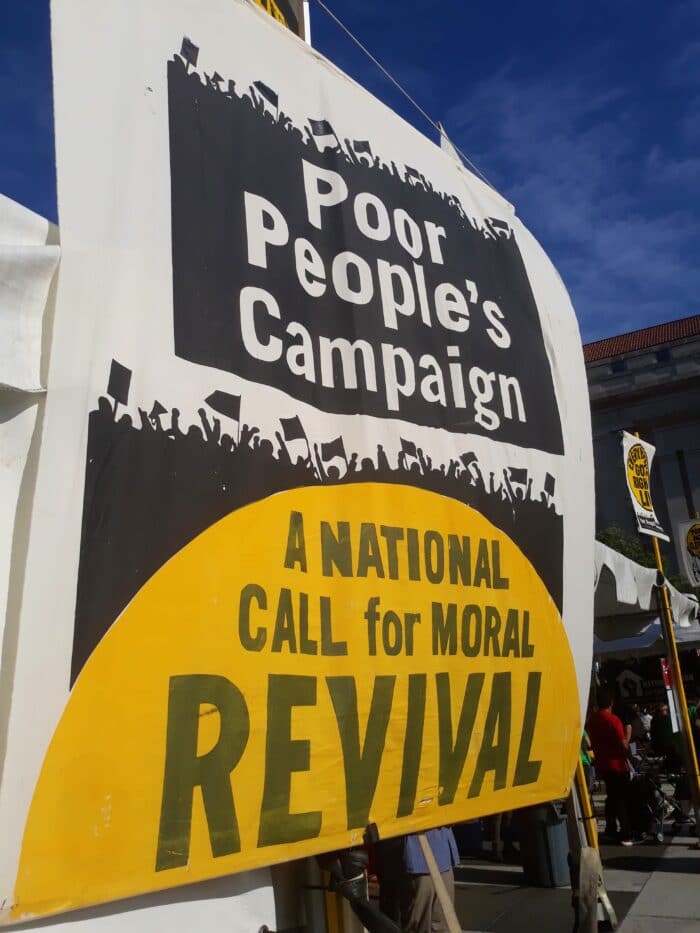
The focus returned, again and again, to the campaign’s organizing principle: fighting poverty with better public policies.
During his rousing keynote, greeted often by loud cheers, Barber paused to lay out the campaign’s seven planned steps between now and the Nov. 8 U.S. midterm elections:
- Get every member of Congress to admit “the reality and pain of 140 million poor and low wealth people” — “not just 39 million,” as some contend, he said — and acknowledge “a moral crisis that must be reckoned with, corrected and repaired.”
- Get Congress to support legislation “developed by poor and low-wage communities.” Examples include the “Third Reconstruction” proposals long outlined by the campaign and now contained in the proposed H.R. 438.
- Demand that President Biden hold a White House “poverty summit.” The campaign wants the administration to meet with “a delegation of poor and low-wealth people, religious leaders, and economists” and “commit to an executive action plan to eliminate poverty in 2022.”
- Wage a “massive mobilization” — by visits, letters, petitions, candidate forums and phone calls — calling on government representatives to address the needs of the 140 million.
- In September, bring a delegation of “5,000 poor and low-wealth people, religious leaders and economists” to D.C. to “walk the halls of Congress” and demand action on those needs. “We are not an insurrection,” Barber said. “We are a resurrection.”
- “Register and educate poor and low-income communities to vote in every election for candidates who commit to address poverty and low wealth from the bottom up.”
- In support of “a movement that votes,” “fight with every tool we have to ensure no voice is excluded from this democracy, no vote is denied.”
“What we are demanding is not radical,” Barber said. “It’s right.”
Healing requires mourning
For all its rousing aspects, the event also had calm and even somber moments.
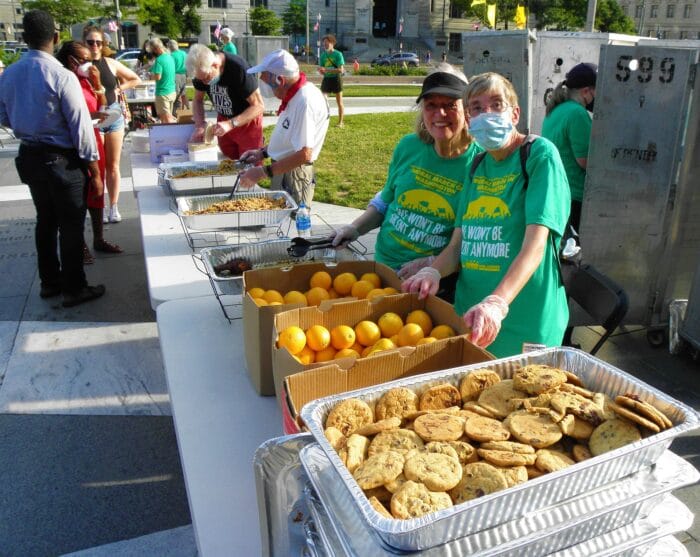
Despite 97-degree heat, a free, communal meal the evening before the rally attracted some 500 people to Washington’s Freedom Square. As Barber told the alfresco activists — who were joined by a few local skateboarders and street people — the meal was meant to illustrate the need that existed within blocks of the Capitol and the White House. It also embodied one of the campaign’s values: “Everyone in, not one left out.”
Later that evening, campaign participants gathered between the Lincoln Memorial and its reflecting pool to remember people who have died of COVID-19 and poverty. After they had respectfully applauded a few initial speakers and musicians, Barber admonished them. “I don’t think applause is appropriate at a gathering like this,” he said. “Can we not smile for just one hour?”
Indeed, the tone of the service’s songs, prayers and litanies was one of weeping, wailing and mourning. Tears literally were shed as Barber invited people who had lost someone to COVID or other tragedies to join him around the podium. To heal, the nation first must mourn, he said. “If this movement can’t cry, nobody can.”
‘This country needs this’
In an email to campaign supporters on June 20, Theoharis said she was “awestruck” by Saturday’s “moral march.” However, “Saturday wasn’t a day of action,” she said. “It was a declaration.”
“Now,” she said, “we will demand real policy solutions. … We’ll do that by insisting that leaders of all levels prioritize policies that raise the minimum wage to $15 and hour, guarantee adequate incomes and quality housing for all, provide quality, affordable health care, protect and expand voting rights, guarantee quality public education for all children, reform the broken immigration system, end the war economy, and ensure the rights of Indigenous people.”
On Saturday, as the UCC delegation headed toward the Capitol, the Rev. Freeman Palmer, Central Atlantic Conference minister, said he saw signs of hope in the gathered crowd. Positive mobilization and encouragement are important, given all of society’s current struggles and conflict, he said. “This country needs this right now.”
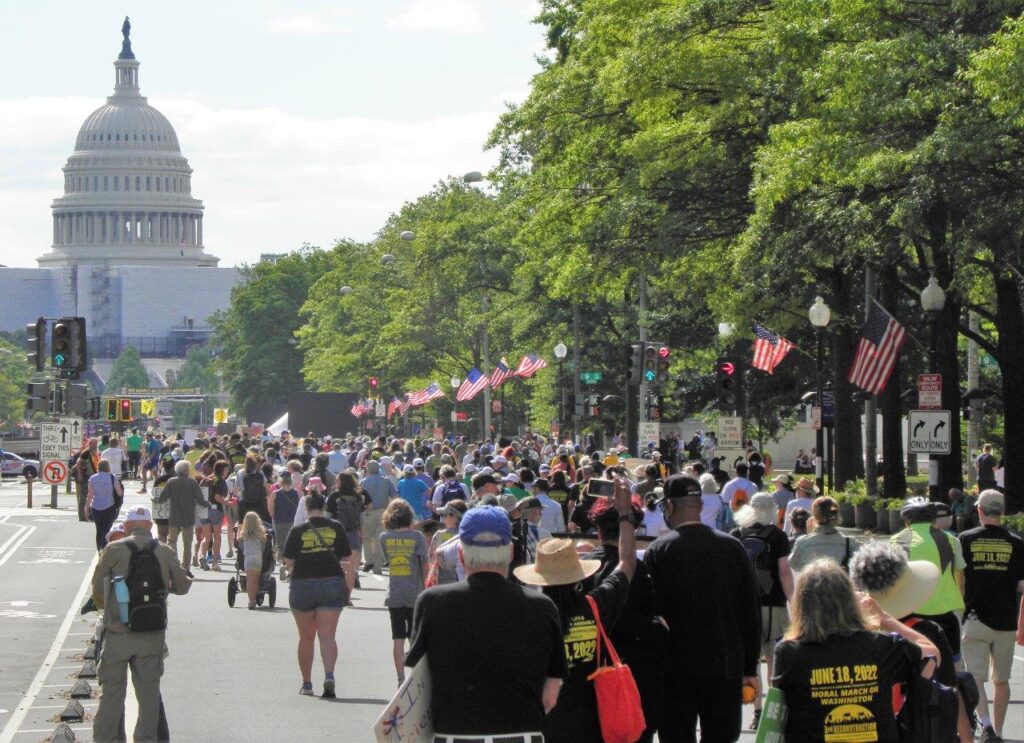
Content on ucc.org is copyrighted by the National Setting of the United Church of Christ and may be only shared according to the guidelines outlined here.
Related News
Colorado church Repair Café mends items and a throw-away mindset
Unraveling wicker chairs, dull gardening shears, and broken necklaces are all items that...
Read MoreGeneral Synod 35 sponsors offer generous contributions to those gathering in Kansas City
When the United Church of Christ gathers in Kansas City this coming July 11-15 for General...
Read MorePreaching and Worship Summit to develop ‘courageous, compassionate, compelling public voices’
The acts of preaching and worship hold a unique power to address the challenges and...
Read More
